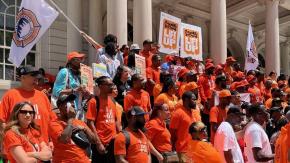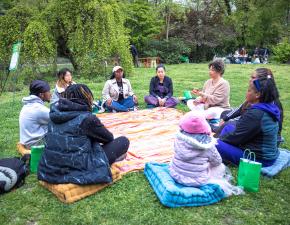
Our communities are safest when they have resources, support, and hope. This Gun Violence Awareness Month, take a look at how our teams across the Center are preventing gun violence by advancing justice in all its facets.
Gun violence inflicts an immeasurable toll on families and communities across the United States. Though horrific mass shootings garner much attention from the media, many more lives are quietly lost in daily gun violence on city streets. That toll doesn’t play out equally: in New York City, young Black men are 88 times more likely to be victims of shootings than their white counterparts. The neighborhoods hit hardest by gun violence are also those that have endured disinvestment, limited economic opportunity, higher rates of unstable housing, and many other effects of systemic racism and inequality.
Yet the typical responses—decades of mass incarceration and aggressive policing—haven’t solved the problem, shedding light on the need for new strategies that build safety by advancing justice in all its facets.
That task calls for many different approaches—ones that work in both courts and communities; that take place before and after harm has been done; and that address survivors, those at risk of engaging in gun violence, and the community as a whole. Here are a few ways our teams are responding to the gun violence crisis by nurturing support, power, and hope for those most impacted.
Mobilizing Communities Against Gun Violence
- Our Save Our Streets (S.O.S.) teams in Brooklyn and the Bronx treat gun violence as a public health issue and respond with education, culture change, and direct engagement with people most at risk. Drawing on the Cure Violence model, we hire respected members of the community—many of whom have experienced gun violence themselves—to defuse conflicts and prevent retaliations, build community, and support young people’s futures by connecting them to education and job opportunities. A recent evaluation found that Cure Violence programs were associated with a 14 percent drop in shootings in New York, amounting to roughly 1,300 shootings prevented over an 11-year period.
Nurturing Healthy, Violence-Free Relationships

- Our RISE Project—short for Reimagining Intimacy through Social Engagement—is rooted in the recognition that gun violence and intimate partner violence are linked and have to be addressed together. The team engages communities across New York City to build education about healthy relationships, change norms around violence, and facilitate healing from cycles of trauma. Through everything from one-on-one outreach to peer discussion groups to community events, they support both survivors and people who have done harm in leading safer, healthier lives.
Helping Young People Heal
- Mentors and social workers from our Queens Community Justice Center’s Uplift program meet with young men of color—both one-on-one and in groups—to work through the trauma and experiences of violence that drive many gun-related offenses. The program helps young people come to a better understanding of themselves, the relationship between violence and victimization, and norms around masculinity. Our Queens Community Justice Center team also offers workshops and interactive learning sessions to teach young people and families about the impacts of gun violence and strategies for peacefully resolving conflicts in the community.
Combining Research, Policy, and Action
- To prevent gun violence, we need to understand what drives it. That means bringing people closest to the problem into the fold when it comes to research and policy decisions around public safety. Led by a team with intimate knowledge of the streets, our newly-launched Street Action Network connects with people involved in gangs and the street economy to change narratives and find lasting solutions to gun violence. The initiative builds on groundbreaking community-led research projects that examined why young people carry guns, uncovering widespread fear and experiences of violence.
Embracing Forward-Looking Responses in Court
- In court, we bring support to young people at risk of gun violence to help them turn their lives around and avoid the harms of a criminal record. Our Midtown Community Justice Center team works in Family Court to connect young people who have been arrested for weapons possession to positive role models and opportunities for growth. We offer similar mentorship, peer counseling, and personal development services to young people with a criminal case in New Rochelle. We also sit on a Gun Violence Advisory Board in New Jersey’s Essex County to help develop better, more productive responses to gun violence in the legal system.
The causes of gun violence are complex, and our responses have to reflect that complexity. Whether we’re defusing conflicts on the street or connecting young people to positive role models in court, all of our gun violence prevention work is grounded in the belief that people and communities are safest when they have resources, support, and hope for a better future.

